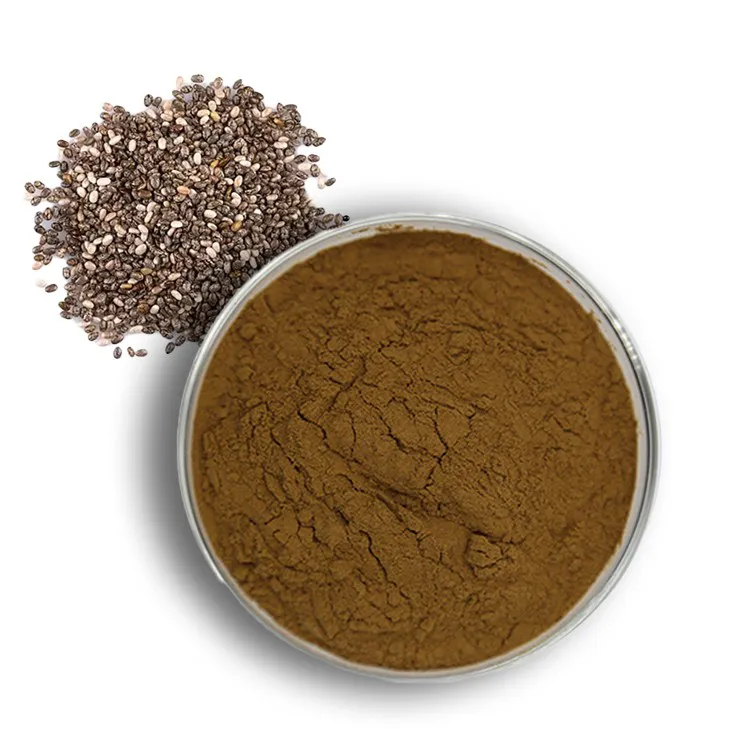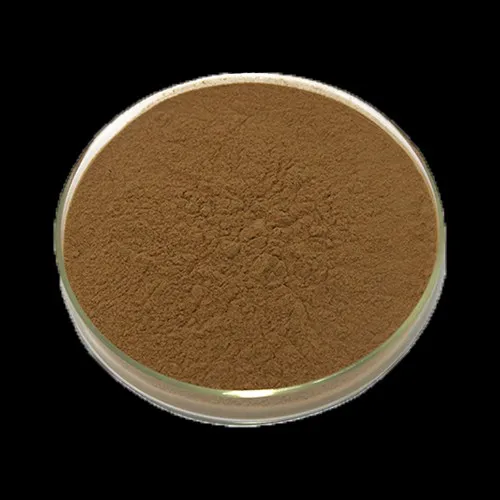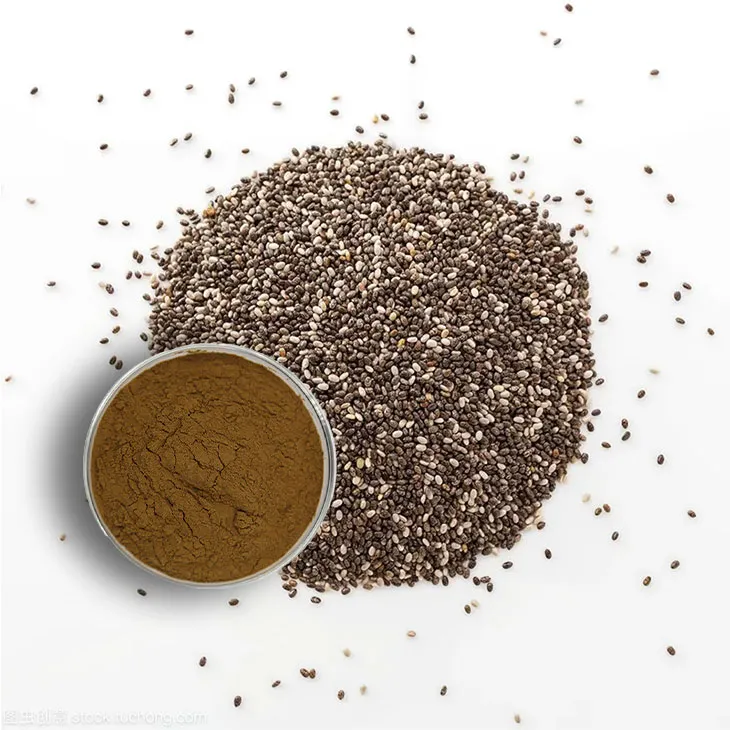- 0086-571-85302990
- sales@greenskybio.com
Organic Chia Seed Powder Factory.
2024-11-28

1. Introduction to the Organic Chia Seed Powder Factory
The organic Chia Seed Powder factory plays a crucial role in the entire Chia Seed Powder supply chain. It serves as the central location where the transformation from raw chia seeds to high - quality powder takes place. This factory is not just a production site but also a key player in promoting the product and ensuring its availability to the end - users.

2. Procurement of Organic Chia Seeds
The process begins with the procurement of top - notch organic chia seeds. This is a critical step as the quality of the final product largely depends on the quality of the seeds used.
2.1 Sourcing from Reliable Suppliers
The factory must establish relationships with reliable suppliers. These suppliers are expected to provide chia seeds that are organically grown, free from pesticides and other harmful chemicals. Organic certification of the seeds is of utmost importance. The factory may have a set of criteria to evaluate potential suppliers, such as their farming practices, quality control measures, and reputation in the market.
2.2 Quality Inspection of Seeds
Once the seeds are received at the factory, a thorough quality inspection is carried out. This includes checking for factors like seed purity, moisture content, and overall physical condition. Any seeds that do not meet the required standards are rejected. For example, if the moisture content is too high, it can lead to spoilage during storage or affect the quality of the powder produced.

3. Processing in the Factory
After the seeds pass the quality inspection, they are sent to the production line for processing. The factory's production line is designed to optimize the extraction of the beneficial components from the chia seeds.
3.1 Cleaning and Sorting
The first step in the processing is cleaning and sorting. The chia seeds are cleaned to remove any dirt, debris, or foreign particles. Sorting is done to separate out any damaged or under - sized seeds. This ensures that only the best - quality seeds are used for further processing.
3.2 Grinding and Milling
Next, the clean and sorted seeds are sent for grinding and milling. This is a crucial step as it determines the texture and fineness of the chia seed powder. Advanced grinding and milling equipment is used to ensure a consistent particle size. The factory may need to adjust the settings of the equipment depending on the desired characteristics of the powder. For example, if a finer powder is required for a particular application, the grinding time or intensity may be increased.
3.3 Packaging
Once the powder is produced, it is sent for packaging. The packaging materials are carefully selected to protect the powder from moisture, light, and air. Different packaging options may be available depending on the target market. For example, for retail consumers, smaller, convenient - to - use packages may be preferred, while for bulk orders, larger containers may be used. The packaging also includes important information such as the product name, ingredients, nutritional information, and usage instructions.

4. Quality Control in the Factory
Quality control is a continuous process in the organic chia seed powder factory. Workers in the factory are trained to ensure that the powder meets the highest quality standards.
4.1 In - process Quality Checks
During the various stages of production, in - process quality checks are carried out. For example, during the grinding and milling process, samples are taken at regular intervals to check the particle size and consistency of the powder. If any deviations from the set standards are detected, corrective actions are taken immediately. This could involve adjusting the equipment settings or halting the production process until the issue is resolved.
4.2 Final Product Testing
Before the packaged product is released for distribution, final product testing is done. This includes testing for various parameters such as nutritional content, microbiological safety, and sensory qualities. The nutritional content is analyzed to ensure that it meets the claimed values. Microbiological testing is carried out to check for the presence of harmful bacteria, fungi, or other microorganisms. Sensory testing involves evaluating the taste, smell, and texture of the powder. Only products that pass all these tests are allowed to enter the market.
5. Promoting the Health Benefits of Chia Seed Powder
The factory also has a role in promoting the health benefits of chia seed powder to the market. Through proper marketing and communication channels, it educates consumers about the value of this organic product.
5.1 Marketing Strategies
The factory may use a variety of marketing strategies. One common approach is through digital marketing. This includes creating a website for the product, using social media platforms to reach out to consumers, and running online advertising campaigns. Another strategy is participating in trade shows and health - related exhibitions. This allows the factory to showcase its products directly to potential customers, including retailers, distributors, and end - consumers.
5.2 Educating Consumers
In addition to marketing, the factory also focuses on educating consumers. This can be done through providing detailed information on the product packaging, as well as creating educational content such as blog posts, videos, or brochures. The educational content may cover topics such as the nutritional benefits of chia seeds, how to use chia seed powder in different recipes, and the potential health benefits such as improved digestion, increased energy, and better heart health.
6. Collaboration with Suppliers and Distributors
Furthermore, the organic chia seed powder factory collaborates with suppliers and distributors to ensure a smooth flow of the chia seed powder from production to the end - user.
6.1 Supplier Collaboration
Collaboration with suppliers is essential for maintaining a consistent supply of high - quality chia seeds. The factory may work closely with suppliers to develop new varieties of chia seeds, improve farming practices, or negotiate better prices. For example, if a new type of chia seed with enhanced nutritional properties is developed, the factory can work with the supplier to ensure a timely supply of these seeds for production.
6.2 Distributor Collaboration
Working with distributors is crucial for getting the product to the market. The factory and distributors need to have a clear understanding of each other's requirements. The factory may provide training to distributors on the product features and benefits, while distributors can provide feedback on market trends and customer demands. This collaboration helps in optimizing inventory management, ensuring timely delivery, and meeting customer expectations.
7. Future Outlook for the Organic Chia Seed Powder Factory
The future of the organic chia seed powder factory looks promising. With the increasing awareness of the health benefits of chia seeds and the growing demand for organic products, there is a great potential for growth.
7.1 Expansion Opportunities
There are opportunities for expansion. This could include increasing the production capacity of the factory, entering new markets, or diversifying the product range. For example, the factory could consider producing different flavors or formulations of chia seed powder to appeal to a wider range of consumers.
7.2 Technological Advancements
The factory can also look forward to technological advancements. New processing technologies may be developed that can further improve the quality and efficiency of production. For example, more advanced grinding and milling techniques may be invented that can produce even finer and more consistent powder. Additionally, new packaging technologies can be explored to enhance the shelf - life and convenience of the product.
FAQ:
What are the main steps in processing organic chia seed powder in the factory?
The main steps involve procuring high - quality organic chia seeds first. Then, these seeds go through a production line which is designed to optimize the extraction of beneficial components. After that, trained workers ensure that the powder meets the highest quality standards during and after processing.
How does the factory ensure the quality of the organic chia seed powder?
The factory ensures quality in several ways. Firstly, it starts with the procurement of top - notch organic chia seeds. The production line is carefully designed for optimal extraction. Workers are trained to monitor and maintain quality throughout the process. Also, strict quality control measures are likely in place to check the final product against the highest standards.
What role does the factory play in promoting the health benefits of chia seed powder?
The factory uses proper marketing and communication channels to educate consumers about the health benefits of chia seed powder. It spreads awareness about the value of this organic product, which helps in promoting its consumption in the market.
How does the factory collaborate with suppliers and distributors?
The factory collaborates with suppliers to ensure a steady supply of high - quality organic chia seeds. With distributors, it works to ensure a smooth flow of the chia seed powder from the production facility all the way to the end - user. This may involve coordinating delivery schedules, quality checks at different stages, and sharing information about market demands.
What makes the chia seeds used in the factory 'organic'?
Organic chia seeds are typically grown without the use of synthetic pesticides, fertilizers, or genetically modified organisms (GMOs). The farmers who supply the seeds to the factory follow organic farming practices, which are likely to be certified by relevant organic farming authorities.
Related literature
- The Organic Chia Seed Industry: Production and Processing"
- "Organic Chia Seeds: Quality Standards and Manufacturing"
- "Chia Seed Powder: From Farm to Factory in the Organic Sector"
- ▶ Hesperidin
- ▶ citrus bioflavonoids
- ▶ plant extract
- ▶ lycopene
- ▶ Diosmin
- ▶ Grape seed extract
- ▶ Sea buckthorn Juice Powder
- ▶ Beetroot powder
- ▶ Hops Extract
- ▶ Artichoke Extract
- ▶ Reishi mushroom extract
- ▶ Astaxanthin
- ▶ Green Tea Extract
- ▶ Curcumin Extract
- ▶ Horse Chestnut Extract
- ▶ Other Problems
- ▶ Boswellia Serrata Extract
- ▶ Resveratrol Extract
- ▶ Marigold Extract
- ▶ Grape Leaf Extract
- ▶ blog3
- ▶ blog4
-
The best nutmeg extract in nature.
2024-11-28
-
Organic Vitamin B9 Powder Factory.
2024-11-28
-
Chinese Dandelion Root Extract Factories.
2024-11-28
-
Bulk purchase of okra extract.
2024-11-28
-
Chinese melatonin factories.
2024-11-28
-
Certified organic kidney bean extract.
2024-11-28
-
Angelica sinensis extract
2024-11-28
-
Marigold Extract
2024-11-28
-
Coconut Water Powder
2024-11-28
-
Citrus Aurantium Extract
2024-11-28
-
Artichoke Leaf Extract
2024-11-28
-
Tamarind extract powder
2024-11-28
-
Citrus bioflavonoids
2024-11-28
-
Echinacea Extract
2024-11-28
-
Almond Extract Powder
2024-11-28
-
Yohimbine Bark Extract
2024-11-28





















